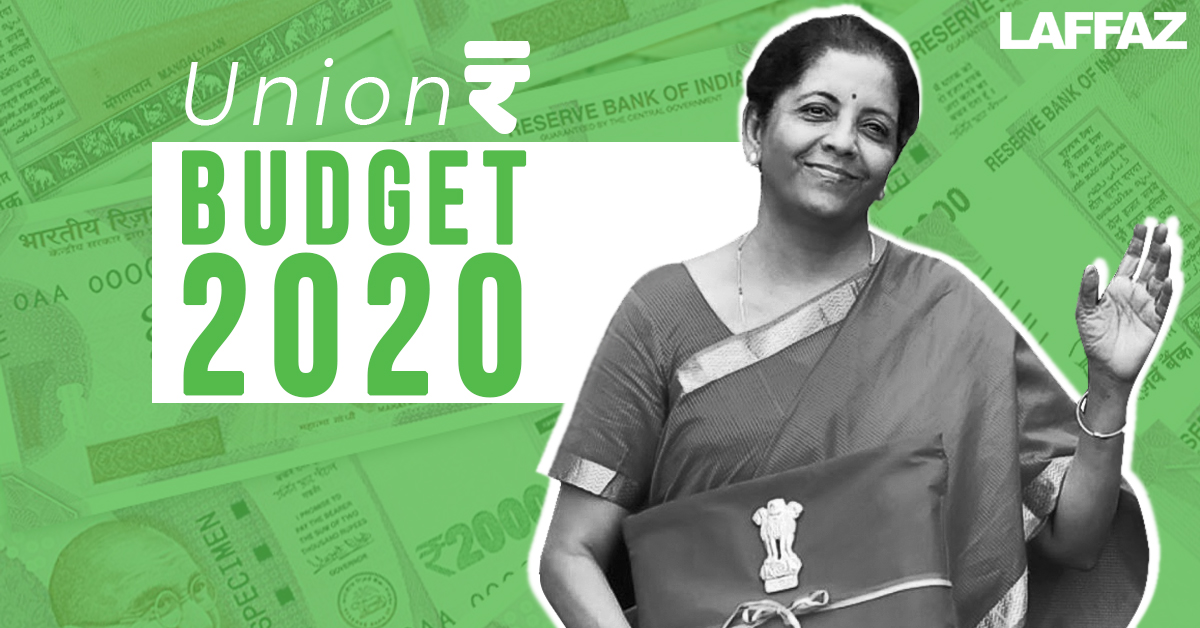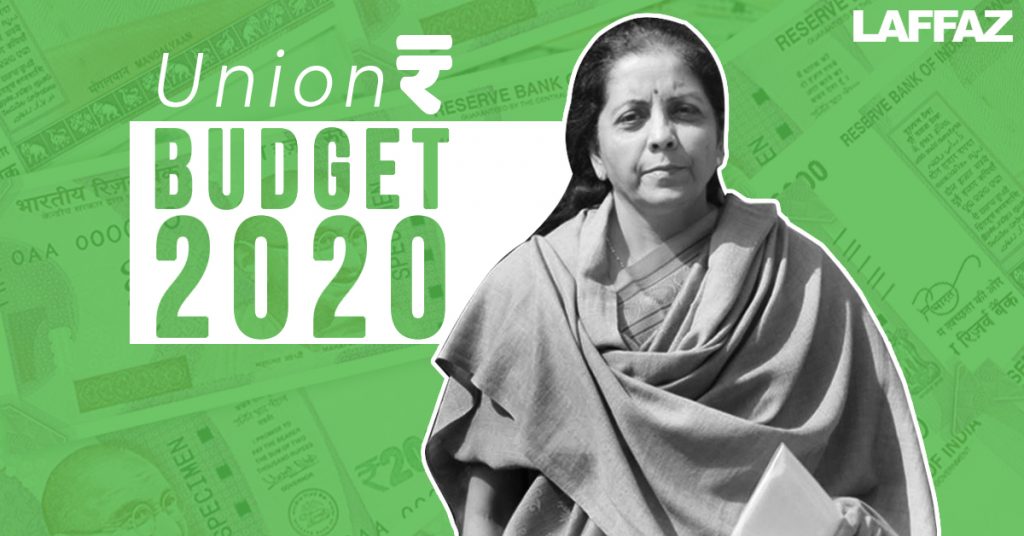Here you can watch the Union Budget 2020 presentation and compare it with the curated list of expectations and wishlist from startups given below.
Union Budget 2020: Prologue
Last year the Union Budget witnessed rate cut in corporate taxes, however, the experts still seek more reforms to elevate revenue across sectors in the country and economic growth. This seems even more significant and challenging when we visualise the $5 trillion bullseye that the government has promised to hit by 2024. The Central Statistics Office has projected the economy’s growth rate for FY20 at 5 per cent, which would be the lowest in the current series considering FY12 as the base year. Undoubtedly, all eyes are on the Finance Minister Nirmala Sithraman with expectations to get the economy back on track.
Expectations from Union Budget 2020
Here’s to our curated list of expectations from the Union Budget 2020:
Expectation #1: Increase in the Income Tax Exemption Limit
Increasing the income tax exemption limit from INR 2.5 lakh to INR 5 lakh is undoubtedly the biggest expectations from the Union Budget 2020 since it concerns every common man of the country. The proposed extension in the limit wasn’t implemented last year.
Expectation #2: Scrapping Long Term Capital Gains (LTCG) Tax Rate
The Union Budget 2018 introduced the Long-Term Capital Gains (LTCG) tax by the former Finance Minister Arun Jaitley. According to which a tax of 10 percent was levied on gains arising from the transfer of listed equity shares exceeding INR 1 lakh without any indexation benefit. However, the industry experts have suggested to scrapping LTCG entirely.
Expectation #3: Abolition of Dividend Distribution Tax (DDT)
The Dividend Distribution Tax (DDT) is the tax imposed on dividends distributed by the companies for profits. Such profits are already taxed before dividend distribution but the companies are still deemed to pay 20 to 21 percent DDT. Additionally, the individuals receiving the dividends are also deemed to pay 10 percent income tax in case the amount exceeds INR 10 lakh p.a. The abolition of DDT will certainly offer higher investments and higher distribution of dividends.
Expectation #4: Lower the tax rate for partnership and LLPs
Partnership firms and LLPs (Limited Liability Partnerships) at present pay 30% in taxes. The government is expected to reduce the percentage.
Expectation #5: Boost to tax-saving for individuals
As proposed by the government earlier this month, a new segment in its tax-saving products under Section 80C of the Income Tax Act has to be created. This new plan is expected to provide tax exemption for an investment of up to INR 50,000 in National Savings Certificates (NSC). The ministry is also considering to allow a maximum investment limit of INR 2.5 lakh for Public Provident Fund (PPF) investors.
Wishlist from startups and Investors
Based on the suggestions laid down by some of the veteran startup founders and entrepreneurs of the country, here’s an extensive wishlist of the Indian Startup Ecosystem:
#01: Provide tax incentives to startups
We hope the government focuses on steps to provide capital to the industry players. This could be in the form of incentivising banks and other financial institutions to lend money to industry participants especially start-ups in the sector. Furthermore, the government could do very well by lowering tax rates and removing exemptions, revisit tax regulations especially for start-ups. This will not only provide tax reforms but also enhance the efficiency of tax collections. On the personal front, the government should reduce taxes by enhancing the slab rates. With lower tax incidence, more will be left with the consumers to spend and consume, which in turn will create demand for products and services.
– Kunal Lakhara, VP of Finance & Operations, Pocket Aces
Firstpost
We hope to Budget 2020 focusses more on the startup sector and on creating a conducive environment for their growth. The first five years after company incorporation should be made tax free for startups. Startup Fund Disbursements should be on Blockchain and visible to everyone. There is also a need to ensure that Zero Capital Gains Tax is charged on any investor who invests in startups once they exit from the venture. This will encourage more investment into new companies. The government should also consider allowing crowdfunding into startups subject to a maximum defined amount. Clear and demarcated tax sops for fintech startups that service the needs of SMEs/MSMEs will help aid growth and encourage more people to become entrepreneurs. Tax relaxation for merchants accepting digital payments will enable India to move faster towards becoming a cashless economy.
– Raj N Phani, founder of Zaggle
Firstpost
#02: Measures to ease compliance & filings
The two important sectors that should be an area of focus in the coming Union Budget is technology and startups. We would like the government to bring in measures to ease the compliance and filings guidelines for startups and eradicate the current penal provisions. Also, with technological disruption being a catalyst for the growth of startups today, we expect the government to make significant investments in technology hubs that will help strengthen emerging technologies such as artificial intelligence, machine learning, internet of things etc.
– Bhavin Turakhia, Founder & CEO, Flock and Directi
Firstpost
Compliances for start-ups’ is a major concern. Most young entrepreneurs, with conviction in their ideas, jump into the business blindly, later realising the amount of efforts that goes into putting together monthly GST returns, TDS filings, PF, ESI, etc., along with that different mandatory audits is a real focus diverter. Entrepreneurs need to focus on their core area of expertise and only restructuring compliances can enable that. Start-ups’ need more support in indirect taxes. Thus, we feel TDS should be 2% for coworking sector as the spaces are on rent and overall margins of coworking operators in most cases are less than 10 percent.
– Akshita Gupta, Co-founder and CMO, ABL Workspaces
Firstpost
#03: Strengthening the government’s initiatives for startups
We are optimistic that with this Union Budget 2020, the government will come up with some major policy and structural reforms towards strengthening their key programs – Digital India, Startup India. The Budget needs to emphasize the importance of better digital infrastructure by improving internet connectivity in rural areas and establishing centers of excellence for research & training.
– Neel Juriasingani, CEO & Co-founder, Datacultr
Firstpost
#04: Ease liquidity for MSMEs
Improve Liquidity through technology and alternate credit models: The Budget this year needs to look at extending the policy to include interest subvention basis digital data of transactions and order fulfilment. Also, an extension of the credit facility via private banks, small banks, NBFCs and fintech lenders is the need of the hour. This framework will ease liquidity for almost 95 percent of the 63 million plus MSMEs that are not in the formal credit fold currently.
– Nitin Mittal, CEO, SOLV suggested
Firstpost
There’s no doubt that the Indian economy of late has relatively weakened. Some measures that the government should definitely look into are – Infusing liquidity in the market that will lead to credit growth and open up the doors for numerous job opportunities. In addition, necessary amendments should be brought in this Budget to simplify the GST structure, rationalize the rates, and ensure a seamless flow of input tax credit, among others. The expectation is that the government should immediately focus on improving the institutional structure and removing obstacles that constrain growth – undertaking bolder reforms of land, labour, regulations, governance, the business environment, and the public sector will help in reducing the cost and improving the ease of doing business in India. It would be encouraging to see the government’s effort to engage the private sector in projects and address financial gaps through public-private participation.
– Navneet Singh, CEO, Avsar HR Services
#05: Initiatives to accumulate foreign capital
The startups are hoping that the Budget will announce initiatives that could pull more foreign capital and boost growth. The reduction in GST charges will encourage more foreign investors to invest in Indian startups. Currently, the tax rate of long-term capital gains is 28.5 percent as compared to the same for listed equities to be 10%. This creates a significant tax burden on founders and employees of startups, as well as domestic angel and institutional investors. Further, the relaxation of personal income tax rates will act as a booster shot. It will certainly help the startup companies and the millenials to improve further and ease doing business.
– Ashish Bhatia, Founder & MD, India Accelerator
Firstpost
#06: Relaxation in GST; Ease of doing business
I am very optimistic about this year’s Union Budget and believe that the primary focus should be on simplifying the GST filing process. This move will greatly benefit SMEs who are the backbone of the Indian economy. While the GST council has taken several steps to simplify the process over the past couple of years, there still exists some lingering issues such as matching of B2B invoices, uploading information on tax returns and compliance burden of SMEs. Also, small businesses that are registered spend a considerable amount of time in obtaining state-wise registration, filing of multiple returns, generation of e-way bills and maintenance of separate books of accounts for each registered entity. I believe that once these issues are addressed, it will increase transparency in the system and bring accuracy to the return filing process. This in turn will prepare the Indian economy for its next phase of growth.
– Shashank Dixit, CEO, Deskera
Firstpost
The tea industry can become a powerhouse for generating employment in India. It can employ a great proportion of the million-plus workforce of the country in a variety of roles. For this, the sector must become more viable through reduction in the costs of production and increase in selling prices. There is a need for a uniform GST of 5 percent to be applied on all products including flavored teas. This will help the industry in sustaining itself. Another major area of focus should be on increasing the budgetary allocation for infrastructure development and ease of doing business in India which will help attract more foreign investments.
– Ambarish Ghosh, Founder & Director, The Hillcart Tales
Firstpost
For Budget 2020, we would like the government to provide benefit to young entrepreneurs in terms of setting up of new companies or supporting new ideas by providing suitable subsidy. There should be a lower corporate tax of Rs 25 percent to 28 percent for young entrepreneurs which have less than to Rs 5 crore turnover. The Government speaks a lot about moving into the digital space and motivate small offline businesses to convert it into online businesses, but there is no support system from the government.
– Kashish Jhamb, Executive Director & CEO, City Innovates
#07: Ecommerce policy
A comprehensive eCommerce policy would provide future direction and confidence in the industry and help investors/ entrepreneurs take decisions faster. There need to be incentives given out to the smaller businesses as against currently growing multinational monopoly, without jeopardizing the business confidence of foreign investors in India as an investment destination. Also, the government needs to come out with a special package for the logistics sector, especially smaller enterprises and start-ups. To start with, Govt. needs to enter a dialogue with logistics eCommerce start-ups and come in govt.-private partnership models for infrastructure/ tech/ skill development and tax sops for strengthening logistics in India.
– Gautam Bansal, SVP Finance, Shiprocket
Firstpost
#08: Efforts to skill the workforce for emerging technologies
As we are chasing to be India’s third-largest economy soon with a GDP of $8.4 by the end of this decade, India has to leverage the demographic dividend that it’s currently enjoying. Through this budget, I hope to see more money being pumped into reskilling and skilling in emerging technologies that could define the path for future growth potential. For our industry as well as in general, our budget expectations lay in more investment in laying foundation and infrastructure for skill development through education that is practical and provides hands-on experience in technology.
– Siddhartha Gupta, CEO, Mercer|Mettl
Firstpost
New-age technologies are disrupting business models and creating numerous opportunities for the youth. However, there’s a considerable gap between what is taught in education institutions and the actual skills required by the industry. The government should introduce measures to empower institutions that are proactively working towards bridging this gap and creating highly skilled human capital for the country.
– Lakshmi Mittra, VP – Center of Excellence (CoE) and Clover Academy, Clover Infotech
Firstpost
We expect the government to put forth focused initiatives that will help India strengthen the momentum of its digital growth and contribute to the global growth story. India is steadily paving its path towards becoming a knowledge economy. However, there is a need for a key focus on upskilling and reskilling amongst the existing workforce and the country’s youth. This will help to bridge the pressing skill-gap and enable them to effectively navigate through the dynamics brought about by new and emerging technologies.
– Sudeshna Datta, Co-Founder & Executive Vice President, Absolutdata
Firstpost
#09: lenient taxation policies
We are looking for the upcoming Budget to include tax sops, especially for the MSME and the SME sector as they contribute in a big way to the growth of the economy and creating new jobs. We hope that the focus of the government lies in bringing back the confidence in consumer spending, and address liquidity that was draining out of the market, in order to increase purchasing power and capacity of individuals. We also wish for ease of VC and PE investment flow in the MSME sector that has high growth potential. This will foster growth for companies striving in this competitive environment to meet their targets. Local businesses, and skill development should be a focal point in order to encourage entrepreneurial behavior in the country which ultimately fulfills the government’s ‘Make in India’ objective. We expect policy reforms in labour, ease of doing business, particularly for retailers that will aid our industry to grow and flourish, including easier credit options and skill development support for the budding workforce entering the industry.
– Rahul Bhalchandra, CEO & Co-Founder, YLG Salon
Firstpost
I hope the government will show full support towards the startup ecosystem. Treating startups in the same bracket as already established multinationals is unsuitable. There should be separate taxation policies along with benefits to ensure ease of doing business for startups. We hope direct involvement and investment from the government towards the startup ecosystem will be extremely encouraging for job creation through entrepreneurship. To give the much-needed impetus to the growth of the economy, the government must provide clarity on FDI regulations as well. The furniture industry would also be elated if the consumer are given House Rental Allowance, to provide them with tax benefits. Together with the support of the government, the startup ecosystem is looking forward to doing greater business in 2020.
– Neerav Jain, Founder & CEO of Cityfurnish
Firstpost
Over 6 crores MSMEs are sharing around 29 percent to India’s GDP and they expect the government will introduce favourable policies and allocate substantial funds for the growth of MSMEs. Presently, out of 32,385 applications filed by MSMEs, 2,031 applications have been disposed of by the government under the delayed payment monitoring system called MSME Samadhaan. Apart from the lack of access to capital, infrastructure, skilled labour and power supply issues are some of the problems that plague MSMEs in India. Therefore, Indian entrepreneur hopes that the Union Budget 2020 will provide some long-term benefits to the MSME sector with better access to credit and lenient taxation policies.
Puneet Jain and Yatin Jain, Directors, ODHNI
Firstpost
#10: Reducing GST for startups working in women safety & security sector
With the rising numbers of crime against women, addressing the issue of women’s safety and security and allocating a portion of the Budget in this regard is what we and other e-commerce startups like us who are working in the safety and security sector are expecting. Lowering the GST rate on women safety products to 5 percent from 18 percent would be one way to go about it. We also expect few women safety products to be as safety is not a luxury but a necessity. The import and export duty should get a revision so that trading in international markets gets a boost. The transportation charges in the railway should see a decline too as these will cut costs and make those safety products more affordable. To promote production in India, the women safety product manufacturers should get special benefits so that products become more affordable to the masses.
– Vishal Saurav, Founder and CEO of Xboom Utilities
Firstpost
We hope the government makes changes in the current GST policy for businesses selling nil GST products and help balance the input–output tax to ensure more competitive prices for the Indian consumers and implement sustainable policies that help increase liquidity in households thereby increasing the consumption in our country in the near future.
– Shashwat Diesh and Aqib Mohammed, Co-Founders, Azah
Firstpost
#11: Boosting the entire AI framework
The Union Budget 2019 of India had claimed Artificial Intelligence to be high on the agenda in the digital sector of the Budget. This announcement was significant, given that China has been consistently building an ecosystem to fuel its ambition to become a world leader in AI, by 2030. The government’s focus should be on bringing policies into the country that encourage the growth of AI companies. This implies that there is less red tape and more progress, further ensuring that entrepreneurs are focused on providing solutions without unnecessary distractions. It would also be great to see if government themselves start allocating budgets for improving public services using AI.
– Abhishek Kothari, Co-Founder, FlexiLoans
Firstpost
ⓘ LAFFAZ is not responsible for the content of external sites. Users are required to read and abide by our Terms & Conditions.






